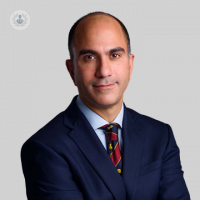Tonsillitis: An expert guide
Written by:In this informative article, highly respected consultant ENT and head and neck surgeon Mr Vikram Dhar shares his expert insight on the signs and symptoms of tonsillitis, as well as common approaches to treatment. The leading specialist also details which conditions can sometimes be mistaken for tonsillitis and when surgical intervention is required.

What is tonsillitis? Why do people get it?
Tonsillitis is an inflammation of the tonsils, which are small clusters of lymphoid tissue located in the back of the throat. People can get tonsillitis due to a viral or bacterial infection. Common symptoms of tonsillitis include sore throat, difficulty swallowing, fever, and swollen tonsils.
Which other conditions can be confused with tonsillitis?
Tonsillitis can be mistaken for other conditions which cause sore throat, such as strep throat or mononucleosis. A healthcare professional can determine the specific cause of the sore throat through history, physical examination and possibly blood tests.
How is tonsillitis treated?
The treatment for tonsillitis depends on the cause of the infection. A viral infection is typically treated with rest, plenty of fluids, and over-the-counter pain medication to alleviate symptoms. A bacterial infection may require antibiotics to clear the infection.
When would a tonsillectomy be needed?
A tonsillectomy, which is the surgical removal of the tonsils, may be recommended in cases where tonsillitis occurs frequently or is severe and does not respond to other treatment methods. The tonsillectomy can be performed using a low energy 'cold steel and minimal diathermy' technique which reduces pain and chance of bleeding.
What is the recovery period like? What are the risks?
The recovery from a tonsillectomy varies from person to person, but most people experience some discomfort and pain for the first week or two after the surgery. Pain medication and a soft diet can help to alleviate these symptoms. There are risks associated with any surgery, including bleeding, infection, and reactions to anaesthesia.
If you are suffering from recurrent tonsillitis and wish to schedule a consultation with Mr Dhar, you can do so by visiting his Top Doctors profile.


